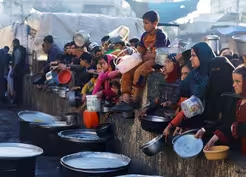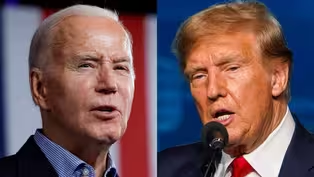
Unaccompanied children make dangerous trek to U.S. border
Clip: 3/13/2024 | 4m 27sVideo has Closed Captions
Thousands of unaccompanied children make a dangerous trek to the U.S. southern border
Tens of thousands of unaccompanied children arrive at the U.S.-Mexico border each year, most coming up from central America in a long, often dangerous journey. Amna Nawaz speaks to a group of sisters who are making the trek alone.
Problems playing video? | Closed Captioning Feedback
Problems playing video? | Closed Captioning Feedback
Major corporate funding for the PBS News Hour is provided by BDO, BNSF, Consumer Cellular, American Cruise Lines, and Raymond James. Funding for the PBS NewsHour Weekend is provided by...

Unaccompanied children make dangerous trek to U.S. border
Clip: 3/13/2024 | 4m 27sVideo has Closed Captions
Tens of thousands of unaccompanied children arrive at the U.S.-Mexico border each year, most coming up from central America in a long, often dangerous journey. Amna Nawaz speaks to a group of sisters who are making the trek alone.
Problems playing video? | Closed Captioning Feedback
How to Watch PBS News Hour
PBS News Hour is available to stream on pbs.org and the free PBS App, available on iPhone, Apple TV, Android TV, Android smartphones, Amazon Fire TV, Amazon Fire Tablet, Roku, Samsung Smart TV, and Vizio.
Providing Support for PBS.org
Learn Moreabout PBS online sponsorshipGEOFF BENNETT: Tens of thousands of unaccompanied children arrive at the U.S.-Mexico border each year, most coming from Central America.
It's a long, often dangerous journey.
And Amna Nawaz spoke to a group of sisters making the trek alone.
And she joins us now from the Arizona border -- Amna.
AMNA NAWAZ: Geoff, that's right.
Just yesterday, in a remote stretch of the Arizona border with Mexico, we met three young girls, three sisters.
Henesis (ph) is 14, Nicole (ph) is 13, and little Valeria (ph) is just eight.
Now, these sisters had just made the 1,500-mile journey from Chiapas in Southern Mexico, where they called home, up to the U.S. border.
Their mother had actually left years ago.
She'd come to the states as the sole provider to support her family.
The girls had been living with a great-grandmother who could no longer care for them, so they headed north to reunite with their mother.
Here in fact is what Nicole told us about that trip.
How did where to go or who to go with?
NICOLE, Migrant (through translator): We got to know a group, and we started trusting each other and helping each other.
AMNA NAWAZ: Why did you leave Chiapas in the first place?
NICOLE (through translator): Because it's too dangerous.
There's a lot of drug trafficking and other stuff.
AMNA NAWAZ: Geoff, as remarkable as it is to see three young girls who have made that very long, very dangerous journey on their own, these sisters are part of a growing trend, officials tell us they are seeing at the U.S. southern border, more unaccompanied minors arriving there, in 2022, a record high of over 150,000.
And like other people arriving at the border, they are coming from more and more countries.
So we have seen some officials tell us they have seen unaccompanied children arriving from as far away as Egypt, India and China -- Geoff.
GEOFF BENNETT: And these journeys are incredibly dangerous for anybody, let alone three young girls traveling without adults.
What did the sisters you met say about that?
AMNA NAWAZ: The girls in many ways are lucky, Geoff, because they traveled on planes and on buses and then on foot for hours.
We connected with their mother.
We spoke to her on the phone and were able to talk to her not only to get her permission to speak with the girls, but also to hear what she had to say.
She said she felt she had no choice.
She had to bring her daughters to her.
She told them to stay calm and to stick together.
I asked, actually, the youngest girl, Valeria, if she was scared at any point in the journey.
Here's what she said.
Was it scary at any time?
Was she worried?
VALERIA, Migrant (through translator): (SPEAKING IN FOREIGN LANGUAGE) AMNA NAWAZ: (SPEAKING IN FOREIGN LANGUAGE) Because you were with your sister?
Geoff, when we met the girls, they had been out there for hours.
They'd long run out of food and water.
The humanitarian aid group we were with, the Green Valley Samaritans, offered both, but they were waiting for Border Patrol to come and pick them up.
As unaccompanied minors, they would be prioritized.
I should mention, when we left them, hours went by.
Because of some confusion and a lack of Border Patrol resources, the girls somehow got left behind at the wall with a larger migrant group.
Night fell and the temperatures dropped.
It is pitch black out there in rough terrain.
It's dangerous with the cartels coming through, and the girls in a panic called their mother, who called us.
We were then able to call around to our contacts and alert Border Patrol there were unaccompanied children still out there on the wall.
They sent a car overnight to go retrieve them.
But all of this just underscores how incredibly precarious this journey can be, even when the girls felt they'd reached safety in the United States -- Geoff.
GEOFF BENNETT: So what happens now, Amna, to those three young girls and to other unaccompanied minors who are making similar treks?
AMNA NAWAZ: Well, for these three girls, there is now a multiagency effort that's been triggered.
They will be passed into HHS custody, which has a system to care and house unaccompanied migrant children.
They will vet their mother, hopefully reunite them in the coming weeks.
We will continue to follow their story.
But the larger question you ask here is exactly right, Geoff.
It's, how is the U.S. going to continue to provide and care for what we know are a rising number of unaccompanied children who are now coming from further and further afield?
It's just one of the many challenges at the border that U.S. authorities now have to deal with -- Geoff.
GEOFF BENNETT: Amna Nawaz, incredible reporting by you and your team there.
We will see you back here tomorrow evening.
AMNA NAWAZ: Thanks, Geoff.
Boeing remains under scrutiny amid quality control issues
Video has Closed Captions
Clip: 3/13/2024 | 8m 21s | Boeing remains under scrutiny amid quality control issues (8m 21s)
How a TikTok ban could violate 1st Amendment rights
Video has Closed Captions
Clip: 3/13/2024 | 7m 50s | How a TikTok ban in the U.S. could violate 1st Amendment rights (7m 50s)
Israel announces plan to evacuate Rafah ahead of offensive
Video has Closed Captions
Clip: 3/13/2024 | 3m 21s | Israel announces plan to evacuate Rafah ahead of southern offensive (3m 21s)
Politics divide families in the run-up to the 2024 election
Video has Closed Captions
Clip: 3/13/2024 | 9m 56s | Political divides cut through marriages and families in the run-up to the 2024 election (9m 56s)
Trump, Biden prepare for rematch after clinching nominations
Video has Closed Captions
Clip: 3/13/2024 | 8m 21s | The 2024 election becomes a 2-man race as Trump and Biden prepare for a rematch (8m 21s)
Providing Support for PBS.org
Learn Moreabout PBS online sponsorship
- News and Public Affairs

FRONTLINE is investigative journalism that questions, explains and changes our world.

- News and Public Affairs

Amanpour and Company features conversations with leaders and decision makers.












Support for PBS provided by:
Major corporate funding for the PBS News Hour is provided by BDO, BNSF, Consumer Cellular, American Cruise Lines, and Raymond James. Funding for the PBS NewsHour Weekend is provided by...




